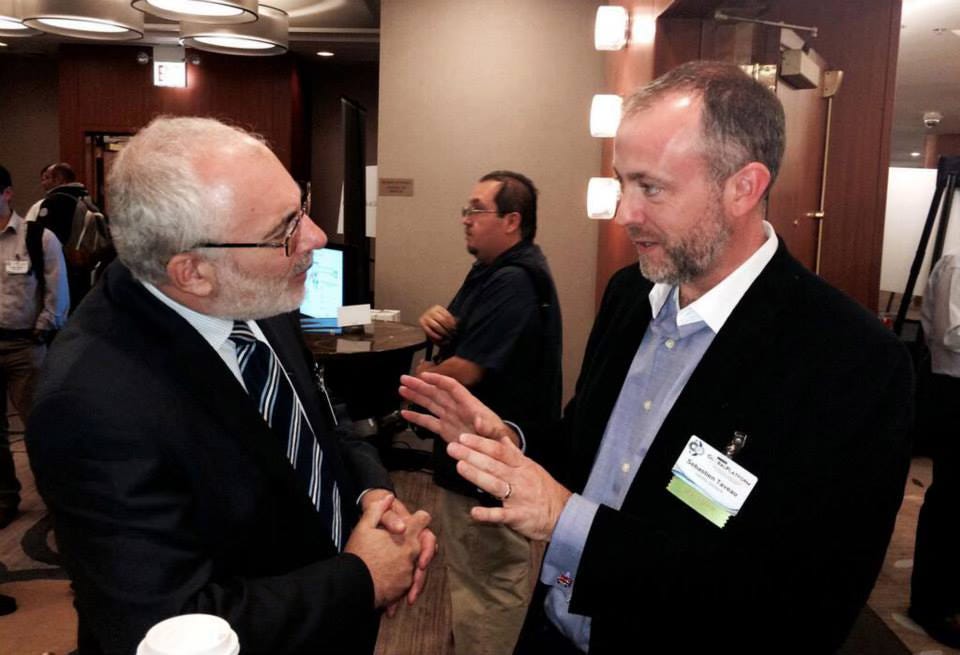Interview Series: Dave Birch
Opening 2024 with an informal chat showcasing the internationally-recognised thought leader in digital identity and digital money.
What better way to start 2024 than to open with another exceptional interview? His name is known across multiple industries and his books are often quoted by experts. More importantly, he is one of the few experts able to mention money, identity, metaverse and AI into the same sentence while still making sense.
Who is David “Dave” Birch?
David G. W. Birch is an author, advisor and commentator on digital financial services. He is an international keynote speaker and recognised thought leader in digital identity and digital money.
David is Principal at 15Mb Ltd., his advisory practice, and Global Ambassador for Consult Hyperion, the secure electronic transactions consultancy. He is Non-Executive Chairman of Digiseq Ltd and holds a number of other board-level advisory roles with companies in Europe and the USA including PaymentWorks, Au10tix and YourSafe.
He is a Senior Research Fellow at King’s Business School in London and a Digital Fellow at the University of Exeter Business School’s DIGIT Lab.
Before helping to found Consult Hyperion in 1986, he spent several years working as a consultant in Europe, the Far East and North America.
And if this was not enough to convince you of how exceptional Dave is, he was kind enough to write the foreword to my book “The Delivery Man” (shameless plug-in). Actually, he even coined the subtitle tag line “The Art of turning ideas into products in Silicon Valley” while we were discussing the concept of the book during a lunch. I wasn’t sure I wanted to write it but Dave encouraged me from Day 0.
His unique sense of delivery makes any of his talks a moment of learning while being enjoyably entertained. His wit makes him a redoutable panel moderator. And despite his dubious choice of soccer team, I am glad to be able to call him a friend and mentor for the past 15 years.
So let’s dig in the interview!
Dave and I trying to “borrow” the cup for one of the Manchester teams.
Delivery Man (DM): "What inspired you to write 'The Currency Cold War', and what do you hope readers take away from it?"
Dave Birch (DB): Well, I started to write The Currency Cold War because I had been involved in an interesting variety of digital money projects of one form or another, some of them successful and some of not so successful. When I saw that people were beginning to get interested in the subject of digital currencies, I wanted to set out why I thought it was such an interesting topic, why my experience had led me to conclude that it was more complicated than it might seem at first glance. I thought, and still think, it’s not just about a new way to pay for things, it is about politics and economics, anthropology and technology altogether. I’m quite proud of packing all of this in to a couple of hundred pages. it became the first of my books to have a Chinese edition, and given China’s interest and early experiments in Digital Currency, I think that is both interesting and flattering!
DM: "How has your background in physics influenced your approach to financial technology?"
DB: If my background in physics has helped at all, it is in two ways: encouraging my curiosity to understand why things work the way they do, trying to understand the underlying drivers that manifest themselves in the observable behaviour of systems and, secondly, in understanding the need for limitations of models. As the famous statistician George Box said, all models are wrong but some are wrong and useful. When you find the right model that is useful in specific environments is vastly improves the communication between stakeholders and the quality of their joint decision-making.
DM: "As a top influencer, who influences you in the realms of digital finance and identity?"
DB: I’m not sure what influencer really means in this context, although it is very kind of you to label me that way. I suppose that it is about having the opportunity to think about way different trends are interlinking. That helps to set an agenda so that organisations can make better decisions about how to exploit new technologies around financial services. I’ve been lucky enough to have been right couple of times and contribute to the evolution of the sector. I’m not an entrepreneur, which is why I admire entrepreneurs so much and enjoy supporting them.
DM: "If you could have dinner with any historical figure, would you choose a renowned economist or someone completely unrelated to finance?"
DB: Dinner with a historical figure related finance would be interesting. I think that my first choice would be Genghis Khan’s visionary minister of finance Yelu Chucai. He persuaded the famously robust Mr. Khan not to kill everyone in China and use it for horse pastures (which was Plan A) but to instead let them live and tax them. World history would have been very different without him. I’d also enjoy dinner with Henry V’s sister Philippa, an amazing woman. She served as regent of Denmark, Norway and Sweden and during this time solved a dispute with the Hanseatic League by establishing a new convention concerning the validity of the coin system, which they had wished for. In 1428, she was hailed as a heroine by the people of Copenhagen for rallying the citizens to fight the League’s fleet in Copenhagen Harbor. She died on 5th January 1430 at the age of 35, an event I with commemorate on this and every 5th January by eating a roasted Danish bacon joint.
DM: "In your book 'Before Babylon, Beyond Bitcoin', you discuss money that understands us. Could you elaborate on what this means for consumer privacy?"
DB: When I wrote in Before Babylon, Beyond Bitcoin about “money to understand us“, I was referring to the collection of data around payments and how (this was an easy prediction to make) the value of that data was greater than the margins on transactions. That was already evident in China and I was sure that it would be a global trend. Payments are utility high volume, low margin business.
DM: "If you were to create a digital currency, what amusing feature would you definitely include?"
DB: If I was going to create a digital currency with an amusing feature, it would be random expiration dates, so that people would be encouraged to change it into useful assets instead of simply hoarding it. The money stuffed under corrupt politicians mattresses would then have a sort of half life and after a a few years would be worth nothing.
DM: "How do you envision the future of digital money impacting global economic disparities?"
DB: I’m not sure how digital currency will impact economic disparities because they are founded on and influenced by many factors of which digital currency is only one. Of course, if you live in a country without a stable currency, it is very difficult to invest and plan for the future, but replacing an unstable physical currency with an unstable digital currency won’t really make any difference to that. I do think that in global political terms America’s economic hegemony would be supported by a digital dollar though!
DM: "If you had to choose a digital currency to use in a post-apocalyptic world, which one would it be and why?"
DB: I haven’t given much thought to the post apocalyptic world, as I would hope it is still somewhere away, but I suppose I’m of the Mad Max school. Forget about paper money or gold bullion! Bullets, fuel and antibiotics would be the most practical and desirable means to circumvent the double coincidence of wants in an irradiated wasteland.
DM: "Can you recall any particularly amusing or unusual reactions to your speeches and writings?"
DB: Unusual reactions? Well I once gave a talk when I referred to an example of a woman waiting for a repair man to come and fix her dishwasher. The organizers received a complaint about my use of gender stereotypes in my example, which was actually about technology for working from home and not really about dishwashers at all.
DM: "What regulatory changes do you think are necessary for the wider adoption of digital currencies?"
DB: The issue of regulatory changes is obviously complicated but my personal view is that regulation should be primarily about encouraging competition. It will be good to see lots of people issuing digital currencies, everyone from the Bank of England to Disney, provided that the safety of the financial system is assured. Perhaps the right regulatory framework would be something along the lines of the electronic money regulations that require the float to be held in “Tier 1” capital. We saw this work in Europe when Wirecard collapsed and the consumers’ money was not affected.
DM: "If you had to choose a mascot for digital ID or finance, what would it be?"
DB: I’ve already chosen my mascot for the world of digital identity, it’s Doctor Who waving psychic paper! I started writing about this decades back when I wanted to find a way to explain how digital identity should work to people don’t spend their whole life thinking about digital identity and don’t understand the underlying technology (politicians, for example). I still think that work as a narrative and I was glad to see that in the new Doctor Who Christmas Special with Ncuti Gatwa, psychic paper made a welcome appearance.
DM: "What are the most common misconceptions you encounter about digital money and identity?"
DB: The most common misconceptions around digit identity and digital money are the absolutes. People who think there should be absolute anonymity or total surveillance are simply wrong. There is a wide spectrum of possibilities and complex trade-offs between the requirements of different stakeholders. It’s a mission of mine, and to be honest I can be quite boring about it at times, that we (ie, technologists) have to get better at explaining these trade-offs to civil society, so it can make choices which we can then implement.
DM: "How do you balance the need for innovation in ID and finance technology with security concerns?"
DB: I don’t think that balancing the innovation in finance with security is all that difficult. On the contrary, I think that we are past the time when financial services had to invent their own security technologies, because there are a range of tried and tested technologies out there – such as zero knowledge, proofs, digital signatures, cryptographic blinding, and so on – that can be used to support innovative new approaches to financial services. With secure infrastructure in place, entrepreneurs can focus on new product and service ideas.
Dave and I having a preparation chat before one of our panels.
DM: "Have you ever considered writing a sci-fi novel, given your knack for predicting financial futures?"
DB: You are kind to say that I predicted a few things, but I didn’t really. I looked out of the corner of my eye and extrapolated from what I saw in some interesting niches. That’s why I don’t really see myself as a futurist, but more of a horizon scanner. I’ve never tried to write a science fiction novel, although I have had a couple of goes at (very unsuccessfully) trying to write a novel. I used to fantasize about being the John Grisham of Fintech until I found out just how hard it is to write a novel!
DM: "If you were to give a TED Talk on the funniest moments in financial history, what stories would you include?"
DB: Wow, a TED talk on the funniest moments in financial history would certainly be something I’d like to see. Whether I could give one or not, it’s hard to say. I’d probably include Michael Novogratz showing off his Terra Luna tattoo and the economist Irving Fisher talking about how American stocks had reached permanently high plateau in September 1929.
DM: "Looking ahead, what emerging trends in fintech and ID do you think will have the most significant impact in the next decade?"
DB: Emerging trends that will have the most significant impact in fintech? I’d highlight two. One of them is AI, which goes without saying, and the other is the Metaverse. I think people made a mistake by writing the metaverse off too early and I think it really be the new version of the Internet. Above all else, I think it will become a safer place to work, rest and play pretty quickly. There’s a good book about this coming out in the spring, by the way…
DM: Dave, thank you so much. As usual you packed a lot of learnings wrapped into your keen sense of humor and wise experiences. As 2024 progresses, we will make sure to follow your commentaries and promote the book.
Note from The Delivery Man: The book is Money in the Metaverse: Digital Assets, Digital Identities, Digital Economies and Why Virtual Worlds Mean Real Business by David Birch and Victoria Richardson (Release Spring 2024).









